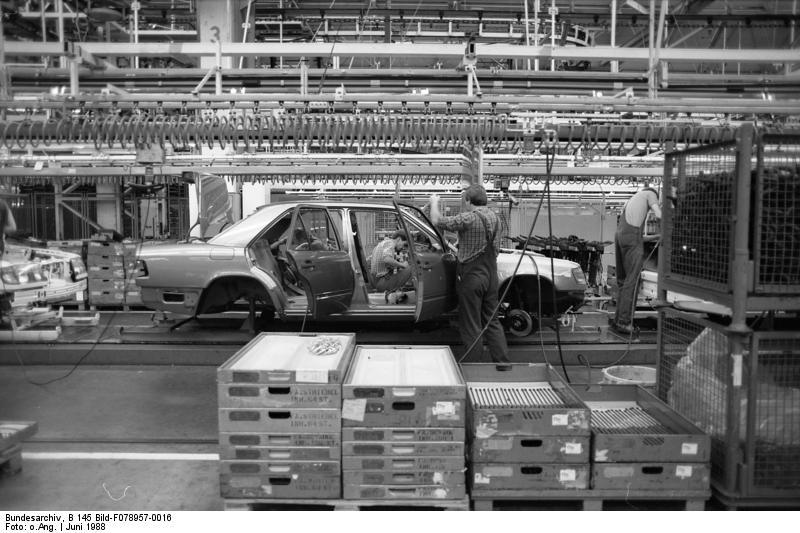If Europe can’t do business with the US, it may turn to China
Workers assemble a Mercedes-Benz at an automotive factory in Stuttgart-Unterturkheim in June 1988. Today, the largest Mercedes assembly factory is located in the US.
The entirety of Germany’s $3.5 trillion economy can fit inside a single national slogan: Made in Germany. But many of the cars, washing machines and industrial parts associated with Europe’s largest economy — the world’s fourth-largest — aren’t actually made in Germany.
BMW is a frequently cited example. One of the company’s largest plants isn’t in its home state of Bavaria, or anywhere in Germany or Europe. It's in Spartanburg, South Carolina. BMW leads the US auto industry in exports, building almost the complete line of X-Series vehicles there.
“People don’t necessarily know this, but trade integration is far greater between the EU and the United States than between China and the United States,” said Mark Hallerberg, dean of public management and political economy at the Hertie School of Governance in Berlin.
That integration is due to similar standards on labor, environment, technology and skills. The two major economies share so much it can be difficult to pinpoint where one ends and the other begins, Hallerberg said. “Both sides have a lot to gain.”
President Donald Trump doesn’t necessarily see it that way. His frequent complaints about trade imbalances have business leaders on both sides of the Atlantic on edge. They worry about the stability of a decades' old trade relationship long assumed sacrosanct.
“Clearly there are concerns, as long as decisions are not made,” said Bernhard Mattes, president of the American Chamber of Commerce in Germany. “Concerns about trade restrictions, the future of NAFTA, import/export duties, or any restrictions that might come up.”
In a new survey the chamber put out to its members, just under 60 percent said investment decisions on either side of the Atlantic are no different now than before Trump took office. But almost one-third aren't sure. An overwhelming majority, more than three quarters, says business would be hurt by protectionism, immigration restrictions, or a repeal or restructuring of Obamacare. These are all priorities for the Trump administration.
Officials at the US Embassy in Berlin, who deal with trade and economic policy not only for Germany but several European countries, are keen to emphasize that relations in both directions remain as strong and warm as ever. They declined to comment on what, if any, changes to those relationships may see. They’re waiting for a number of top posts in the Trump administration to be confirmed by the Senate or even nominated by the president. This includes deputies at both the Department of Commerce and the Office of the US Trade Representative.
Far from the embassy, in a quiet, suburban corner of Berlin, reliable trade relations with the US are a matter of life or death. Here, Berlin Heart produces highly specialized heart pumps for people around the world suffering from severe heart failure. Berlin Heart depends on the US for 40 percent of its sales, and 100 people in the US depend on Berlin Heart to stay alive while awaiting a transplant.
Sven Friedel, a managing director, said his company is for now holding off on new initiatives with US-based partners. “It's really unpredictable what is the next step of this administration. And the steps they have taken or what they talk about is more or less unclear,” he said.
One element of Trump trade policy is clear: a strong preference for bilateral deals. Speaking at the Center for Strategic and International Studies in Washington in September, US Trade Representative Robert Lighthizer said they are easier to enforce than multilateral agreements. They also allow the US to take advantage of its size.
“The working assumption is that if you have an $18 trillion economy, you can do better negotiating individually,” he said.
Bilateral thinking is in line with moves the Trump administration has made against other areas of international cooperation. This includes formally withdrawing from TPP, ending US participation in the Paris Climate Accord and UNESCO, and a seeming ambivalence about TTIP, the Transatlantic Trade and Investment Partnership.
Now it’s NAFTA that the Europeans are monitoring. What comes out of renegotiations of the North American Free Trade Agreement would impact non-North American companies that produce and sell within the US, Canada and Mexico. It could also provide insight into the Trump administration's thinking on free trade elsewhere.
But the US isn't the only major economy that can throw its economic weight around, said trade policy expert Mark Hallerberg. The EU, which by law negotiates trade as a bloc, is bigger than the US in terms of population and almost as big in GDP. It posted trade surpluses for both goods and services in 2016, and it isn't waiting for the Trump administration to make up its mind.
“The Europeans are saying if we can't do things with the Americans, we'll do them with the Japanese, maybe even China,” Hallerberg said. “The Canadian one is a done deal. So [the EU] is looking around and saying how else can we do these sorts of treaties?”
Our coverage reaches millions each week, but only a small fraction of listeners contribute to sustain our program. We still need 224 more people to donate $100 or $10/monthly to unlock our $67,000 match. Will you help us get there today?
